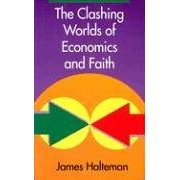This chapter introduces some of the key concepts that the book will deal with. In order to think about the choices people make, it’s important to think about the world we live in. We live in a world where resources (time, money, natural resources, etc.) are scarce. “Scarce” doesn’t mean “hard to find,” it simply means limited. There’s not enough for everyone to have everything that they want and need. The world got that way because of sin. In the Garden of Eden there was abundance for all, and it will be that way again in heaven.
Economics is the study of the decisions people make in the presence of scarcity.
So, given that the wants are greater than resources, what do we do?
1. Do we simply choose to want less?
2. Do we figure out ways to produce more?
3. Do we figure out how to distribute what we have in a more effective manner?
Those are the three ways of approaching the problem of scarcity.
The author hints that he will talk later about how Christians should choose to want less. He also points out that this concept might go against the “natural tendency” of personal freedoms and wanting more instead of less.
He also mentions that
“since per capita economic growth was not an expected outcome of economic behavior throughout most of history, it is easy to understand why Jesus, in the first century, was oriented more toward conservation and redistribution than toward expanded production” Pg. 18.
So, there’s something about the ideas & systems in place in Jesus day that is inherently different from our own today. That’s an important point.
In today’s world figuring out ways to produce more is the norm. A country’s economic well-being is often crudely measured by its economic output divided by the population (GDP per capita). By finding ways to increase output, you find ways to increase standards of living for everyone.
Distribution leads to questions about fairness. What system allocates goods and services both efficiently and equitably? We currently use democratic capitalism. What did they use in Jesus’ day? What other options are available? Do any of you think about these things?
This ties into the author’s depictions of worldviews (Pg. 20). In ancient times, it was God and authorities who were seen responsible for a people’s well-being. Distribution was decreed by God’s Law or by king’s degree. In the Middle Ages, it got a little more complicated. Social structures and religious authorities defined how people live. God was seen as less-involved, having left the world to operate on the Natural Laws which He created.
I’ve been reading a book about how the mathematics of probability and forecasting didn’t develop until after the Reformation. After the Renaissance, people began to question authorities and look for scientific explanations; beginning to think more for themselves. This freedom led some societies down a secular path, embracing science and rejecting spiritual.
This leads to the Modern worldview where the world and the people in it seem to be following all-natural patterns. Economists have developed models for people’s behavior which can often be explained in mathematical jargon and graphs. I will often refer to “rational” behavior as the behavior of people operating under their natural tendencies (perhaps I should call it “natural” behavior). But, Spirit-led behavior looks different than natural behavior and cannot easily be explained by economic models.
Lastly, the Postmodern worldview where all truth is relative and there are no anchors. “What is true for you? From what traditions do you come?” (Pg. 22).
I find this paragraph interesting:
“It took the church many decades to integrate the Enlightment (modern) view of the world with historical Christianity. Some things, earlier considered wrong, now had to become acceptable. Examples include commercial activity, climbing a socioeconomic ladder, and charging interest” (Pg. 22).
These are all practices that seem to be up to the individual believer, providing she does not take it too far.
Do you think that modern Christianity has justified the acceptance of practices earlier considered “wrong,” possibly sin?
The author then outlines the layout of the book.
Discussion Questions:
1. Is it true that people of all income levels and social structures feel a constant sense of shortage, whether of things or of time?
2. Is it a Christian virtue to be satisfied and stop striving for more?
3. From the brief description of modern and postmodern worldviews, what challenge do you see for the Christian in each worldview?
Feel free to comment on any of the above questions.
Let’s get the discussion started!

